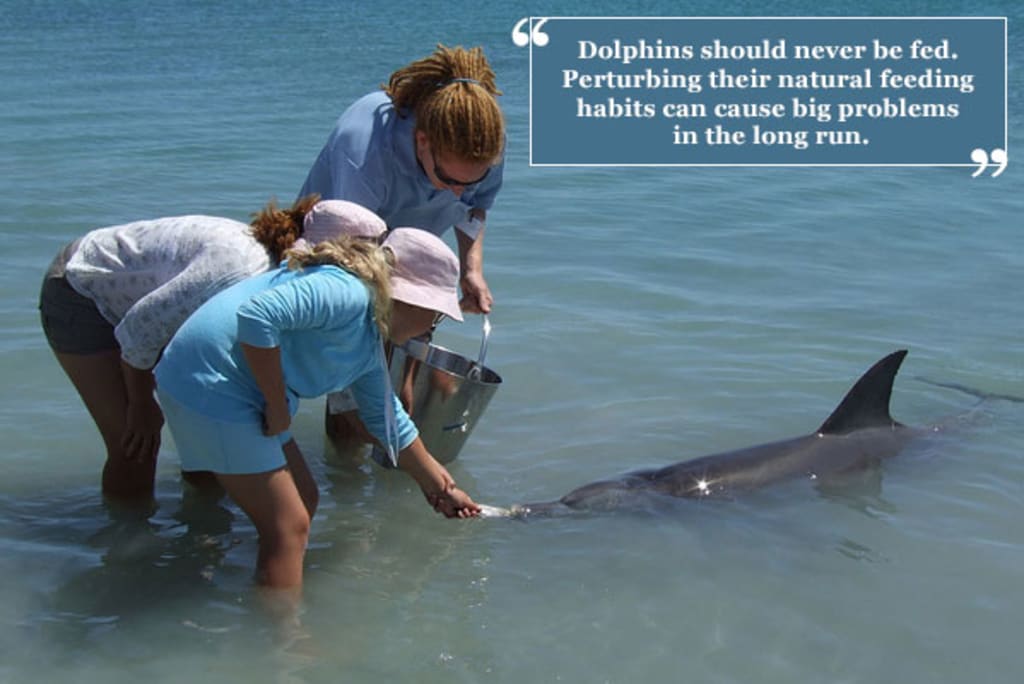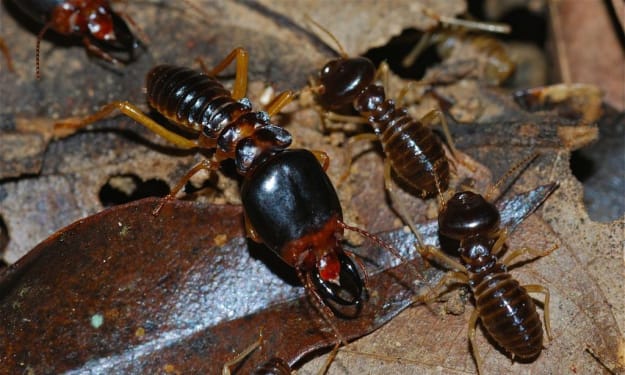Don’t Feed Wild Marine Mammals
Feeding marine mammals such as dolphins and seals is illegal in the United States.

In a previous article, I discussed how one California woman attempted to stop a group of beach-goers from harassing a colony of wild sea lions. Although I did talk about how it's illegal to play with, touch, or even feed a wild marine mammal, I did not mention how it can inflict potential harm. Word of caution, what I am about to describe may be a little upsetting to some readers, but at the same time, it’s critical to be very cautious when watching marine mammals out in the wild.
1. Why is it illegal to feed wild marine mammals?
Because all marine mammals (whales, dolphins, seals, and sea lions) are protected under the Marine Mammal Protection Act. The law states that if you feed a marine mammal out in a wild setting, or, at least make such attempt to do so, you are not only putting you, a friend, or a loved one at risk but also, the life of the animal in question at risk as well. This risk involves the likelihood of developing injuries that can result from such interaction that could end up being investigated by NOAA's Office of Law Enforcement for harassing a wild marine mammal.
2. How is feeding marine mammals harmful?
In the wild, marine mammals usually feed on fish and squid that they can hunt and catch on their own. Feeding a wild marine mammal can cause them to lose their natural ability to avoid humans and boats as a result of being conditioned to beg for handouts instead of hunting for prey. If the food is spoiled or is not part of their regular diet, they can become sick. They can also get injured or die if they get too close to boats or get entangled in fishing gear as a result of taking bait and catch. Besides, there have been many cases where people have been bitten by dolphins and sea lions while trying to interact with them out in the wild. For example, in Florida, there has been one report of a woman who decided to swim with a pair of wild bottlenose dolphins after she fed them from her boat. From there, the two animals one of the animals bit her in her left leg, which then, lead to her having to rip it out of the animal's jaw. She ended up having to stay in the hospital for a week.
3. How can a marine mammal survive without handouts?
Even if an animal has been thoroughly conditioned to rely on handouts, it's implausible that it will depend on humans as a food source. Although conditioned animals may continue to exhibit signs of begging humans for food, they will continue to show signs of having some foraging behavior. However, it's still crucial for people to avoid feeding the animals to prevent reinforcement of these behaviors because the best chance for these animals to survive out in the wild is for them to be able to find their food and not rely on people to feed them.
4. What if I want to meet an animal in person? Is there a legal way to do this?
In the United States, many marine mammal facilities offer educational programs that enable the public to meet one of the animals living under their care. These programs may involve a 15-20-minute training session where the trainer is joined by a paid guest to do a meet-and-greet with a marine mammal. It consists of taking part in a training session and consists of the guest to ask the animal to perform specific behaviors and give them a rub-down, a treat, or an EED (an environmental enrichment device) as a reward for delivering the asked behavior. The nature of these programs may vary by facility, and for more information, they should check out the Alliance for Marine Mammal Parks' website. Still, marine mammal facilities offer the public a chance to meet their favorite marine mammals up-close in person without the risk of breaking federal law. Also, they also make the educational disclaimer for guests not to make any attempts to touch, feed, to play with wild marine mammals.
5. If I were to spot someone feeding a marine mammal, how can I report it?
If you spot any illegal activity that involves a person feeding a wild marine mammal, or Office of Law Enforcement at 800-853-1964 and please share any evidence you have about the incident in question such as photos and video.
6. What should I do if I spot an injured marine mammal?
If you ever spot an animal that is either injured or entangled, please call the Greater Atlantic Animal Reporting hotline at 1-886-755-6622 and please provide them photos and videos, along with additional details like the exact location of the injured animal. Besides, for those who do not live in either New England, nor anywhere along the East Coast, please call the Marine Mammal Center in California at (415) 289-7325, or (808) 326-7325 for those who live in Hawaii.
Learn More:
Alliance for Marine Mammal Parks and Aquariums
Like my work, please send me a tip or support my work on Patreon for as little as $1.00 a month. Your Contribution would allow me to continue educating and informing people like you about wildlife and the importance of preserving nature.
About the Creator
Jenna Deedy
Zoo and Aquarium Professional, Educator, Cosplayer, Writer and B.A. in Psychology whose got a lot to share when it comes to animals, zoos, aquariums, conservation, and more.
Instagram: @jennacostadeedy






Comments
There are no comments for this story
Be the first to respond and start the conversation.